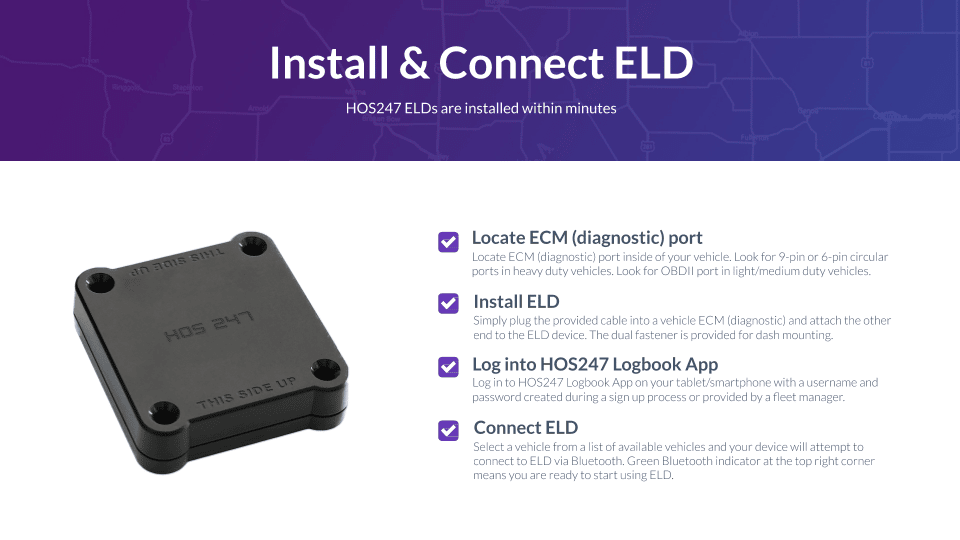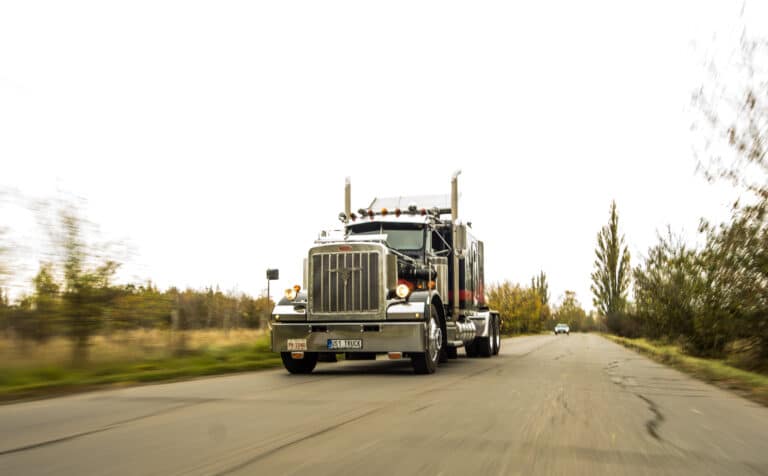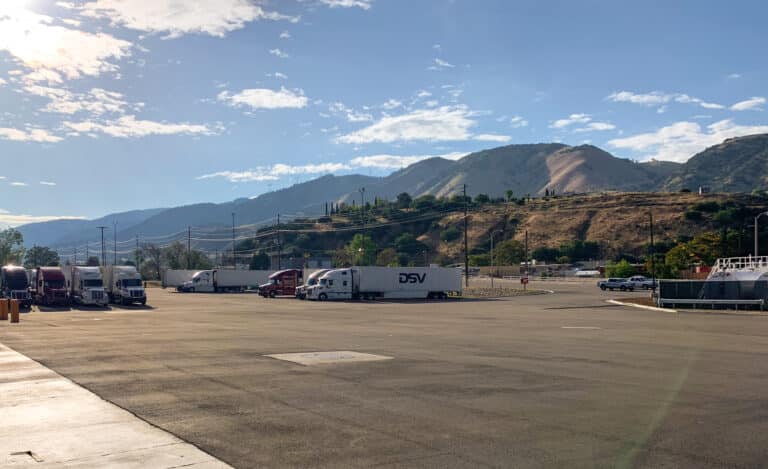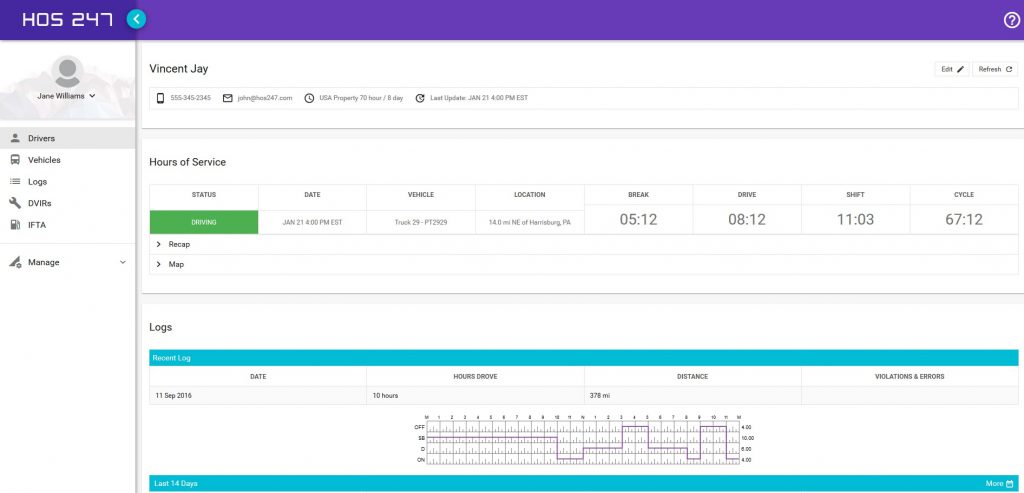Carriers operating under the ELD mandate can benefit from choosing the right logbook to help them achieve compliance and greater profitability. We’ve drafted the ELD trucking guide to help you choose your electronic logbook wisely.
What Is ELD in Trucking?
Transport Canada defines an ELD as a certified electronic logging device or technology that automatically records and maintains driver HOS records. These e-logs increase safety and streamline operations. Here is a brief summary of the benefits an electronic logging system can offer.
Improve Road Safety
Electronic logbooks maintain automated records of duty status to prevent violations of Transport Canada HOS regulations. They also enable fleet managers to be aware of drivers’ issues with the vehicle or compliance to offer immediate assistance so they can keep driving.
Increase Efficiency
As electronic logs automatically record HOS through engine start-up and stop, there is much less chance of human error or tampering. An ELD also tracks mileage and RODS to prevent idling time. The device alerts the company in case the driver takes a longer break than the permitted limit. This helps managers track driver performance thereby improving carrier productivity.
Simplify Vehicle Management
Advanced ELD systems are designed to automatically turn vehicle records and diagnostics into driver vehicle inspection reports (DVRIs). The system keeps track of scheduled maintenance and notifies fleet managers in advance, which saves a lot of human labor and paperwork and prevents breakdowns.
Reduce Costs
Elogs save on penalties for violations of Transport Canada rules and reduce audit risks. Fuel usage can also be decreased by monitoring idling. DVIRs and maintenance alerts increase vehicle’s useful lifetime and value over time, helping carrier companies increase productivity and reduce the cost of fleet management.
The ELD Mandate and Progressive Enforcement
The ELD mandate was issued by the Government of Canada and will be enforced by Transport Canada. The mandate states that commercial vehicle drivers must record hours of service on an electronic logbook device that is certified. The Canadian ELD mandate was officially announced on June 13, 2019, and has been in effect across Canada since June 12, 2021. However, the Minister of Transport decided that full enforcement would begin a year later, and later expanded that period by six months. On March 7, 2022, the CCMTA announced that the final compliance deadline will be January 1, 2023. Carriers will not be penalized for not installing electronic logging devices until then. This means all applicable fleet companies and commercial vehicle drivers must switch to electronic logbook devices from paper logs to maintain the HOS records before the 2023 deadline.
Key Facts on the Canadian ELD Mandate
Here are some specifications on the Canadian ELD mandate:
- ELD mandate rules have been standardized to prevent HOS errors, logbook manipulation, and driver harassment.
- HOS regulations for Canadian commercial drivers remain unchanged with this new mandate.
- All paper logs or unapproved electronic logging devices need to be replaced with compliant elog solutions that automatically integrate with the vehicle engine ECM.
- The final mandate issued in June 2019 for Canada does not have the grandfather clause that allows carriers to continue using uncertified ELDs beyond the effective date, which is now January 1, 2023.
- To get certified, electronic logbooks are required to comply with the technical standards stated in the ELD mandate. All logbooks must be approved by a third-party certification body accredited by the Minister of Transport. As of March 17, 2022, there are three:
Who Should Comply with the ELD Mandate in Canada?
The federal Canadian electronic logbook mandate applies to vehicle drivers and carriers involved extra-provincial transportation. It also includes the local activities of those carriers, because any extra-provincial operations come under federal jurisdiction. In Canada, this means over 150,000 drivers. Carriers that operate within a specific province will come under provincial jurisdiction and not federal jurisdiction.

Differences between the U.S. and Canadian ELD Mandates
The ELD mandate issued by Transport Canada is different in some aspects from the FMCSA mandate issued in the United States. These differences are based on-duty hours, log updates, ELD registrations, etc. Here are some of the key factors that differentiate the Canadian ELD mandate from the FMCSA mandate of the U.S.:
- Personal conveyance hours of a driver are tracked differently. While the U.S. mandate has no limits on distance and time, the Canadian mandate has set a strict 75 km limit on the distance covered by a driver.
- HOS rules are different in both mandates. The U.S. mandate allows a 30-minute break after a non-stop driving of 8 hours. This is different from the Canadian mandate that allows 2 off-duty hours that a driver can take at any point during their 16-hour window.
- In the United States HOS is transferred to ERODS, while in Canada the HOS directly reaches the officer carrying out the inspection.
- The Canadian mandate requires third-party certification of electronic logbooks while the United States allows any provider to self-certify the device.
Similarities between the U.S. and Canadian ELD Mandates
As there are differences, there are similarities too between the Canadian ELD mandate and the U.S electronic logbook device mandate. Take a look at the common factors between them:
- Driving status is automatically updated when the electronic logging system detects the speed of the vehicle is 8km per hour or more.
- After the engine stops for an uninterrupted period of 5 minutes, the logbook asks the driver if the status needs to be changed to “off-duty”.
- While driving in a customer’s yard, the elog needs to be activated to ‘yard move’ mode so that the driver’s ‘on duty’ status does not change to ‘off duty’.
- The registered logbook must be capable of detecting a minor fault or diagnostic problem and a major fault in the vehicle.
- The elog system should enable the driver to manage unassigned driving time by providing options to accept or reject it anytime.
- Any changes that are applied to the elogbook must allow the driver to manage or edit and annotate them.
It is also important to know that, since the Canadian mandate requires compliant trucking electronic logbooks to be certified by approved third-party agencies, carriers operating in Canada have fewer device options than their American counterparts. As a result, carriers will most likely look for a reliable provider offering certified-ELD.
HOS247 is one the top-rated solutions offering top-rated ELDs for truckers in both the U.S and Canada. HOS247 electronic logbook solutions are available with a no-contract policy under flexible plans to suit the requirement of fleet companies and individual owner-operators.
How to Choose an ELD Device
Electronic logbook providers are taking advantage of the mandatory requirements by offering assorted devices for HOS monitoring. Before you sign on a dotted line, make sure the device you choose is the best fit for your trucking needs. At a minimum, the ELD vendor should explain how their product meets Transport Canada standards.
Check Reviews
Do your homework before buying the shiny package to make sure it contains what you need. Electronic logbooks are expensive, especially when multiplied by the number of vehicles in your fleet. Compare reviews from sources you trust, such as truckers like yourself who use them every mile of every road. Some reviews offer demo videos about each product or you can check out app distribution platforms. HOS247 is a top-rated electronic logbook provider with google-verified reviews.
Ease of Use
If an elog requires ten certified engineers with fancy degrees to work, beware. If any driver must read a manual the size of a law book, watch out. ELDs are automatic and should be almost as easily operated as a cell phone. Try out the HOS247 solution with no contracts and hassle-free, two-week return policy.
Technical Support
If you or your drivers have questions about the logbook, support should be available when you need it. Drivers or fleet managers should be able to talk to other human beings to get support, rather than recordings or robots. Your business and time are too valuable for anything less which is why HOS247 takes customer service and support seriously and offers assistance in multiple languages seven days a week.
Red Means Danger
Walk away if the provider tries to sell expensive additional hardware to make their system work. Most drivers have smartphones or tablets that are less costly to run and they are already familiar with. The added expense won’t be worth it over the long haul. Also, watch out if they require you to sign long contracts. A year contract or less usually means the provider believes in their product enough to let the customer decide to stay.
ELD Trucking Exemptions
The ELD mandate does not apply for commercial vehicles operating in Canada that meet certain exceptions. Here are the criteria of ELD exemptions as laid down by Transport Canada:
- A commercial vehicle does not require a registered ELD when operating under a permit.
- If a carrier has been issued an ELD exemption under the Motor Vehicle Transport Act, then they do not come under the rules of electronic logbook mandate.
- If a vehicle is driven under a rental agreement for a period of 30 days or less, then the ELD mandate does not apply. Exemptions will not be granted on renewed or extended rental agreements.
- If the vehicle model is older than the year 2000, then the ELD mandate does not apply.

Other Features
Some of the other features to make your trucking operation run smoothly include GPS tracking, IFTA mileage reporting, and dispatch. These are ways to optimize your business’s operations.
GPS Tracking
GPS tracking follows each vehicle in real time. It is easier to plan effectively and efficiently from the data that is available through ELD. Each vehicle and driver are accounted for as they travel.
IFTA Calculations
The International Fuel Tax Agreement (IFTA) simplifies fuel taxes for carriers that operate between the lower 48 U.S. states and Canadian provinces. Carriers file fuel tax reports quarterly. Those fuel tax reports are mandatory for vehicles weighing over 11,797 kg (26000 pounds) with either 2 or 3 axles or a combination of axles. Distance can be automatically calculated, which is a great time-saver.
Dispatch
Without automation, assigning loads to drivers involves a ton of phone calls and paperwork. Extra features mean that HOS information can be used to determine the available drivers in the area so assigning loads is quicker and efficient. Progress can be easily tracked so drivers and customers get what they need. All these features can help you manage your fleet and increase revenue. Products are delivered on time with better customer service.
About HOS247
HOS247 offers software solutions for your trucking business. Our reps are dedicated to helping you get the most out of your devices through outstanding customer service. The ELD Mandate is the law throughout the land, and HOS247 customer support will help every step of the way. Multilingual representatives who speak English, Spanish, Russian, and Polish can answer your questions in your language from Monday to Sunday. There are no contracts, and hardware can be returned for a hassle-free refund within the first two weeks.

I’ve co-founded, built and managed several transportation-related businesses. Now, I’m a founder and CEO of HOS247 – an AI Transportation Platform for trucking companies, freight brokers and other logistics operations. We are transitioning old-style operations to technology-advanced logistics entities and help them to grow their businesses. ELDs (electronic logging devices), fleet tracking and management 2.0 combined with AI-powered dispatch tools.












The open road has always meant freedom for truckers, but today’s trucking industry comes with challenges beyond driving skills alone. From hours-of-service compliance to fuel management and maintenance tracking, modern trucking requires effective management tools to stay competitive and compliant.

GPS fleet tracking for small businesses is one of the most cost-effective and useful tools found in the trucking sector. Smaller-scale businesses can perform very well because of their capacity for lean management. Using technology to optimize processes and effectively

The Canadian ELD Mandate is a fact of life for most drivers and trucking companies. This article presents some guidelines on how to choose ELD devices, how to stay on top of a trucking company and driver regulatory needs, who
